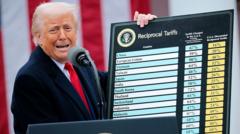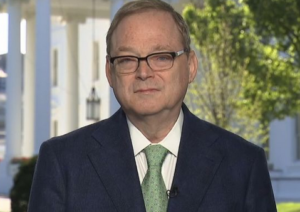As China's tariffs on American imports reach a staggering 125%, the ongoing trade conflict raises alarms for economic stability in both nations, with particular anxiety felt by American farmers dependent on the Chinese market.**
Escalating Trade War: China Responds with 125% Tariffs Amid U.S. Pressure**

Escalating Trade War: China Responds with 125% Tariffs Amid U.S. Pressure**
China retaliates against U.S. tariffs, raising its own to 125%, intensifying concerns over a global economic downturn.**
The trade conflict between the United States and China has intensified as Beijing announced on Friday a sharp increase in tariffs on U.S. imports to 125%, retaliating against U.S. tariffs that now amount to a minimum of 145% on Chinese goods. This tit-for-tat escalation hammers home the mounting anxiety among businesses and consumers about an impending global recession.
The latest move from China emerged swiftly after President Trump directed new tariffs that raised already substantial import taxes on various goods, aggravating an already volatile economic environment. In the wake of this announcement, China’s commerce ministry condemned the U.S. actions as detrimental to fair trade, labeling them a form of economic coercion. “There are no winners in a tariff war,” they stated, echoing fears that continued escalation might only lead to further isolation for the U.S. economy.
Market reactions to this trade war have been tumultuous, with American stocks suffering considerable declines as investors digest the economic ramifications of these rising tariffs. This week alone, the Stoxx Europe 600 index saw a dip of approximately 1%, while U.S. futures suggested a marginal recovery after earlier sell-offs. However, fear looms large, signaled by a dramatic increase in volatility metrics akin to those seen at the onset of the COVID-19 pandemic.
American farmers, who largely depend on the Chinese market for their exports, now face an uncertain future. The agriculture sector—particularly soybean cultivators—stands to bear the brunt of these tariffs. With China traditionally being the largest market for American soybeans, many farmers fear that prolonged tariffs could devastate their operations, much like what happened during past trade disputes.
During a committee hearing, U.S. Trade Representative Jamieson Greer faced pointed questions from lawmakers worried about potential retaliation from other countries. Various agricultural groups have implored the Trump administration to swiftly negotiate a new trade deal to prevent further losses. “If this drags on, our farmers will suffer immensely,” warned Caleb Ragland, the American Soybean Association’s president.
As the administration grapples with the fallout from its trade policies and rising rates of inflation, the pressure mounts to ease tensions with China swiftly. Trump’s conflicted messages leave many Republicans anxious as they tread the line between support for his hardline stance and the necessity of maintaining stable economic relationships. With ongoing uncertainty about trade policy, the implications for the broader U.S. economy remain to be seen, suggesting that Congress may have to grapple with the ramifications sooner rather than later.
The latest move from China emerged swiftly after President Trump directed new tariffs that raised already substantial import taxes on various goods, aggravating an already volatile economic environment. In the wake of this announcement, China’s commerce ministry condemned the U.S. actions as detrimental to fair trade, labeling them a form of economic coercion. “There are no winners in a tariff war,” they stated, echoing fears that continued escalation might only lead to further isolation for the U.S. economy.
Market reactions to this trade war have been tumultuous, with American stocks suffering considerable declines as investors digest the economic ramifications of these rising tariffs. This week alone, the Stoxx Europe 600 index saw a dip of approximately 1%, while U.S. futures suggested a marginal recovery after earlier sell-offs. However, fear looms large, signaled by a dramatic increase in volatility metrics akin to those seen at the onset of the COVID-19 pandemic.
American farmers, who largely depend on the Chinese market for their exports, now face an uncertain future. The agriculture sector—particularly soybean cultivators—stands to bear the brunt of these tariffs. With China traditionally being the largest market for American soybeans, many farmers fear that prolonged tariffs could devastate their operations, much like what happened during past trade disputes.
During a committee hearing, U.S. Trade Representative Jamieson Greer faced pointed questions from lawmakers worried about potential retaliation from other countries. Various agricultural groups have implored the Trump administration to swiftly negotiate a new trade deal to prevent further losses. “If this drags on, our farmers will suffer immensely,” warned Caleb Ragland, the American Soybean Association’s president.
As the administration grapples with the fallout from its trade policies and rising rates of inflation, the pressure mounts to ease tensions with China swiftly. Trump’s conflicted messages leave many Republicans anxious as they tread the line between support for his hardline stance and the necessity of maintaining stable economic relationships. With ongoing uncertainty about trade policy, the implications for the broader U.S. economy remain to be seen, suggesting that Congress may have to grapple with the ramifications sooner rather than later.























